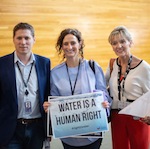
Water as a Human Right
Water is a human right. It’s quite a straightforward concept really, meaning everyone can agree with it, at least in theory.
In 2010, the UN General Assembly recognised the human right to water and sanitation, and acknowledged that clean drinking water, as well as sanitation, are essential to the realisation of all human rights.
This UN resolution called on States to provide safe, clean, accessible and affordable drinking water for all.
An obvious finding, but still nice words that everyone could welcome. In theory.
However, the context of this right is that water is an unequal resource to start with. Fresh water is only 3 per cent of the world’s water, and yet manages to sustain human existence on this planet.
Even still, 2.5 per cent of that water is locked up in glaciers or otherwise too difficult to access. Seventy per cent of the remainder is then used in agriculture, and then there’s industrial production, all of which requires water, from plastic production to apparel sweatshops.
So what about our drinking water?
While all angles of politics can join the chorus on “water is a human right”, it’s easy to agree with it principle. But a positive human right in theory alone is not a human right at all.
Without structures and determined attempts to realise this right, the words remain on paper.
The realisation of this basic human right, as agreed on at the UN, is what the Right2Water movement is grounded in. What this movement struggles for, is making the human right to water a tangible and actionable human right.
This mass movement acknowledges the disproportionate access to safe, clean drinking water and believes it is an injustice that must be actively tackled.
Three and half million people die around the world due to water-borne illnesses every year.
The stark reality of water inequality proves that nodding heads around the human right to water in theory or in principle achieves nothing.
However, in Europe, the inequality of the geographical distribution of water is not the key issue.
The real obstacle comes with the ownership of water infrastructure and management of water resources. It’s a different question of distribution, one centred on ownership, and therefore, a story of controlling resources.
In the EU, 1 million people lack access to clean drinking water. Deliberately denying ethnic groups, such as the Roma community, access to water is a policy of certain Member States.
Moreover, water poverty is a serious issue across Europe, with households unable to afford to pay their water bills.
Regressive taxation, worsened by the privatisation of water infrastructure, has brought working class people across Europe to their knees.
With this context, the Right2Water movement made three straightforward demands: no liberalisation of water services, guaranteed water and sanitation for all in Europe; and universal access to water and sanitation.
This amounted to the first European Citizen’s Initiative, or ECI, with nearly 2 million people signing this petition, forcing the EU to take account of these demands.
I was the rapporteur for the European Parliament report in 2015 on the follow up to the ECI Right2Water. This report, which was adopted by the Parliament, called on the Commission to recognise the right to water, that water is a public good and not a commodity.
It called for the Commission to conduct a study on water poverty and review the governance of water policy.
The European Parliament was resolute in affirming this right, and expected a decent response from the Commission, to give life to this right locked in ink on paper.
In the much-awaited response, the European Commission came up with its solution an article on access to water in the recast of the Drinking Water Directive.
The European Commission could take a sigh of relief, dust off its hands and finally put the Right2Water movement to sleep.
This woefully insufficient response made a mockery of the Right2Water ECI, as well as the petition system itself, which was introduced in an attempt to democratise the EU and give people a say in the EU’s agenda.
The new Article 13 lays out a list of some necessary measures for Member States to take to improve access for all to water intended for human consumption. These include identifying people without access, setting up outdoor and indoor water infrastructure, and promoting tap water.
It’s quite hard to conceptualise this as enshrining the human right to water in EU law.
Through a shambolic process of negotations within the Parliament, the Parliament’s report did an even further injustice to the Right2Water movement. Thanks to a rap- porteur who did not want Article 13 in the first place, the three obligations on Member States on access were reduced to options.
Yes, you’re right in questioning how a human right can be upheld à la carte.
The right to water has been battered and bruised by the EU institutions, and it still hasn’t even been through Council.
The interests are strong in keeping the right to water just a right in theory. Positive rights in practice cost, and the EU is proving itself to have the vested interests at heart, rather than the interests of the most vulnerable and marginalised in our society.




